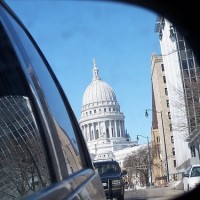“Verse Lines When the Streets Are on Fire.” James Matthew Wilson offers a stirring defense of poetry in a season of chaos: “Disease, disorder, and riot are reminders to us of the mortality and fragility of all worldly goods and that the way to live most intensely and richly, here in the world of our history, is to live every moment as if it were a window into the immortal and the eternal.”
“Mars Hill Audio Journal: Volume 147.” Ken Myers talks with Jason Peters about localism and the FPR manifesto: Localism in the Mass Age.
“A Restored Midwestern Landscape: On Mark Shepard’s Restoration Agriculture.” Matt Miller reviews Shepard’s provocative recipe for “farming in nature’s image” on a large scale.
“A Doorstop Theory of Civilizational Decline.” Tony Woodlief makes an error in the education of his three-year-old twins and draws important lessons regarding educational priorities and civilization.
“Locating Our Invisible Wounds.” Leah Libresco Sargeant meditates on the public solidarity generated by the coronavirus:
The crisis has made us all look at each other more closely. In a time of lockdown, it’s the people nearest us, whom we may not have known or chosen deliberately, whom we have to rely on. The pandemic is pushing us past the limits of whom we previously trusted or entrusted ourselves to, and we have the opportunity to learn to extend ourselves in love, even when we no longer are forced to.
“World Localization Day.” Local Futures and Helena Norberg-Hodge are hosting an online event tomorrow to promote local economies and communities.
“Land Loss has Plagued Black America Since Emancipation–Is it Time to Look again at ‘Black Commons’ and Collective Ownership?” Julian Agyeman and Kofi Boone propose some ideas to enable more black Americans to own productive property.
“The Pain of Losing One’s ‘Place.’” When Hurricane Michael destroyed Timothy Kleiser’s childhood home, it prompted him to reflect on the myriad ways in which we can lose our places and how we might regain them.
“The Coronavirus and the Right’s Scientific Counterrevolution.” Ari Schulman remains one of the most level-headed guides to science, expertise, and the pandemic (don’t miss his G.K. Chesterton-inspired conclusion). Here’s his basic thesis:
The story of the crisis is not quite that of scientists who knew the answers and one political party that just wouldn’t listen to them. Rather, it is a story of fracture—of conflict and confusion, of experts earning mistrust, of each side cultivating its own class of experts to own the other’s. It is also a perverse story of how a group of self-styled truth-telling outsiders turned science’s mythology against its institutions, warping it from a tool to fight the virus into a tool to attack the establishment.
“Postliberal Epistemology.” Tara Isabella Burton critiques Enlightenment epistemology and sketches the contours of a postliberal, Christian epistemology: “To venerate disembodied reason—and with it individual will—is to buy into a false vision of humans as both totally unrooted and ultimately interchangeable. It is not just an epistemological but also a moral, a spiritual, and a political stance: one that the past half decade has revealed is both unsatisfying and unsustainable.”
“Taking Back America From the Libertarians.” Patrick Deneen argues, contra George Will and Brad Thompson, that the American tradition has long had a robust concern for the common good.
“Statesmanship in a Time of Violence.” Jon Schaff laments our lack of capable statesmen and considers the reasons for this lack: “The job of the statesman is to direct the people toward just government. His tools for this task are rhetoric and the rule of law. . . . For the statesman political life is not merely about the accumulation of power, but how power is wielded for the common good.”
“Cops and Teachers.” Chris Arnade critiques the two favored solutions to urban decay: cops who impose order and who teachers who extract the “bright” students. “Yet both systems have failed to build locally run institutions that serve the needs and wants of residents.”
“The American Soviet Mentality.” Izabella Tabarovsky compares the history of “collective demonizations of prominent cultural figures” in Soviet Russia to today’s outrage mobs. She begins by describing the condemnation of Boris Pasternak: “It was during that campaign that the Soviet catchphrase ‘ne chital, no osuzhdayu’—‘didn’t read, but disapprove’—was born: Pasternak’s accusers had coined it to protect themselves against suspicions of having come in contact with the seditious material.”
“An Essential Business: Satisfying the Needs of the Soul.” Justin Bonanno applies the wisdom of Simone Weil’s The Need for Roots to the challenges of responding well to the challenges posed by the coronavirus. (Recommended by Rob Grano.)
“Wendell Berry Endorses Mike Broihier.” Wendell Berry makes a rare political endorsement.
Campaigning for Bread and Roses.” FPR contributor John de Graaf outlines the platform for the Bread & Roses Party; he is running as the Vice President on their ticket this cycle.
“LGBT Rights Ruling Isn’t the Beginning of the End for Religious Liberty.” Daniel Bennett takes stock of this week’s Bostock ruling from the Supreme Court: “The case will certainly have major implications for religious exercise. But contrary to initial reactions, this decision should not be read as a decision that dooms religious liberty in America, but rather as an inevitable step toward something Congress and most state legislatures have thus far been unable to do: crafting a compromise that balances LGBT rights and religious freedom.”
“Two Constitutions in Conflict.” Michael Brendan Dougherty considers the implications of Christopher Caldwell’s The Age of Entitlement: America Since the Sixties.





